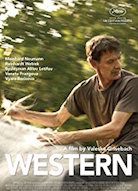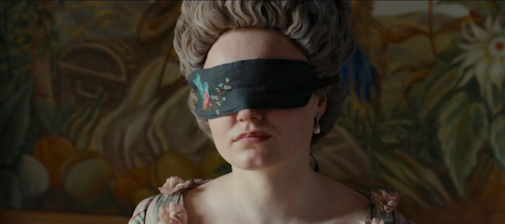Three can't-miss movies directed by women on the festival circuit
 Thursday, September 21, 2017 at 6:00PM
Thursday, September 21, 2017 at 6:00PM our continuing adventures at TIFF with a little NYFF thrown in.
 This year I made a conscious effort to see films directed by women at the Toronto International Film Festival. Nearly half of the films I screened had women behind the camera! Even though a few of them were unsatisfying, a handful were gems so praise be to TIFF that there were so many to choose from. Other festivals haven't been as inclusive. We've already discussed the tragic romance of Mary Shelley, the visually stunning The Breadwinner, the what-were-they-thinking Kings, the confounding but admirably crafted Zama, the dramatic misfire of Euphoria, and Hungary's strange and totally involving Oscar submission On Body and Soul.
This year I made a conscious effort to see films directed by women at the Toronto International Film Festival. Nearly half of the films I screened had women behind the camera! Even though a few of them were unsatisfying, a handful were gems so praise be to TIFF that there were so many to choose from. Other festivals haven't been as inclusive. We've already discussed the tragic romance of Mary Shelley, the visually stunning The Breadwinner, the what-were-they-thinking Kings, the confounding but admirably crafted Zama, the dramatic misfire of Euphoria, and Hungary's strange and totally involving Oscar submission On Body and Soul.
I saved the three best for last. If you get a chance to see Western (playing at NYFF September 30th and October 1st), the Austrian costume drama Mademoiselle Paradis, or a hard to describe miracle from Indonesia called The Seen and the Unseen please take it. Unfortunately none currently have US release dates (though Western does apparently have some sort of stateside distribution planned for 2018). We'll take them alphabetically after the jump...

Mademoiselle Paradis (Austria | Germany)
She's not a pretty sight. Mademoiselle Paradis opens with a confrontational lengthy closeup of the young homely titular woman playing piano. Her eyes are continually rolling or crossing or both. At first she's hard to look at but the Austrian director Barbara Albert (Falling, Free Radicals) forces your hand. Or, rather your eye. We quickly realize that this pianist is blind or nearly so. What follows is a harsh but fascinating costume drama about experimental medicine, musical reveries, beauty and its beholder, and more. The mademoiselle's loveless parents, who prize her only for her prodigious musical gift but are otherwise embarrassed about her, enroll their daughter in yet another experimental treatment. When this treatment appears to actually make a difference - how much is the subject of debate - things change for the young woman dramatically.
At 97 minutes the movie is a brisk eccentric historical curio (based on a true story!). But oh how it lingers. Days later I find myself astonished at the number of thematic balls Albert's kept in the air the entire time, and how incisively she evokes class inequities in healthcare, the political battles behind medical advances, the loudness of the color yellow (just saying! I hate that color) and a relatively intricate web of personality clashes. Color me disappointed that this eccentric and riveting drama is not an Oscar submission this year for Austria. Despite all the powdered wigs and bizarre outmoded medical scenes, it feels unusually timely.
Grade: B+

The Seen and Unseen (Indonesia)
One of the greatest pleasures of cinema is the ability to get lost in other worlds. One of the deepest sadnesses of festivals is seeing something essential and truly cinematic that you never hearing anyone else talking about while everyone else flocks to some Hollywood picture that'll be in regular theaters in a month's time. Both were exemplified in this amazing Indonesian drama from Kamila Andini. The film's simple story is of 10 year old twins in rural Indonesia experiencing a great loss. Early in the film the boy makes a curious walk right out of the rural slice-of-life scene we've been watching and is seen in that setting no longer. His twin sister struggles with their separation and at first won't enter the hospital room where he's now living. Her fear doesn't last and soon they're playing together on his bed whenever he's able. At home the lonely sister communes (haunted is not quite the right word) with what appear to be ghosts of dead children; they sometimes emerge from farm fields (like silent raven-haired Children of the Corn) and other times join the girl in expressive silent movement in the hospital, like a troop of miniature modern dancers doing site specific choreography. Andini's mysterious movie is ineffably sad but spiritually energizing, peaking with two incredible dialogue-free sequences, both perfectly placed and forming an impressive narrative arc between them, in which the girl twin dresses herself and her brother up in chicken and monkey costumes to pass the time. Do not miss it if it plays a festival near you.
Grade: A-

Western (Germany | Bulgaria | Austria)
Writer/director Valeska Grisebach's latest follows a group of German construction workers doing a job in Bulgaria far from home. As is apparently Grisebach's process, she cast non-actors and locals, choosing people for their authenticity and regional flavor. She's struck gold with her indelible leading man Meinhard Neumann, whose memorable face and lean body conjure poses filled with projections of interiority and recall numerous Western films. He's a near perfect evocation of the kind of taciturn, masculine loners that the western genre thrives on in its heroes.
One of the film's most moving elements is Meinhard's slow assimilation into the foreign culture he works in, by way of an effort to befriend and ride a local horse who roams about the hills between a local village and his work site. The cast is mostly male, apart from two key Bulgarian women, one at the center of a dispute over an unwelcome advance from Meinhard's boss and the other, a woman who Meinhard feels peculiarly domestic with but with whom he can't communicate. The ensemble and milieu allow for some wonderfully organic tensions and commentary around masculinity and wanderlust. Western hypnotically rethinks a decidedly American genre through the lens of intra European conflicts and travel.
Grade: A-



Reader Comments (8)
From your description this Indonesian drama is prime Best Foreign Language Film material. Will they submit?
I mean: poetic movies with kids ALWAYS get nominated.
Ok I'm an Indonesian and I HAVE NEVER HEARD OF THE SEEN AND UNSEEN! And I believe that they have decided to submit TURAH as the Oscar submission this year., which I also haven't seen.
Cal & Craver -- well Toronto was the world premiere so it's just now being seen. but it was scheduled on the last weekend and so many people had left town and i weep that influential critics didn't see it. It's great. (Perhaps it will be Indonesia's submission next year since it hasnt yet premiered in Indonesia?)
THE SEEN AND UNSEEN received a development grant from the Asia Pacific Screen Awards (the people I work for) so I'm very happy to hear you loved it.
Glenn yay!
nice
put the right way to the entertainemnt